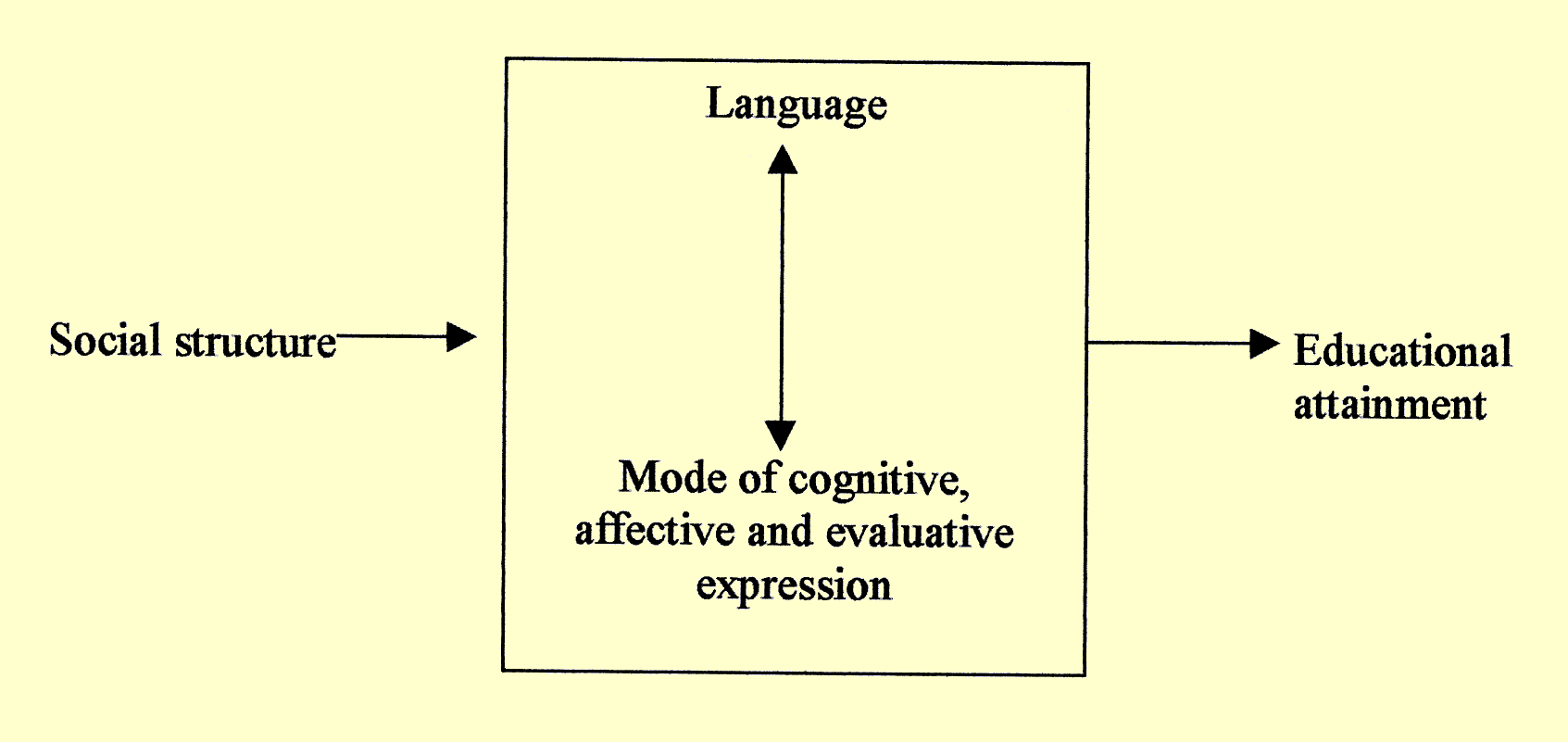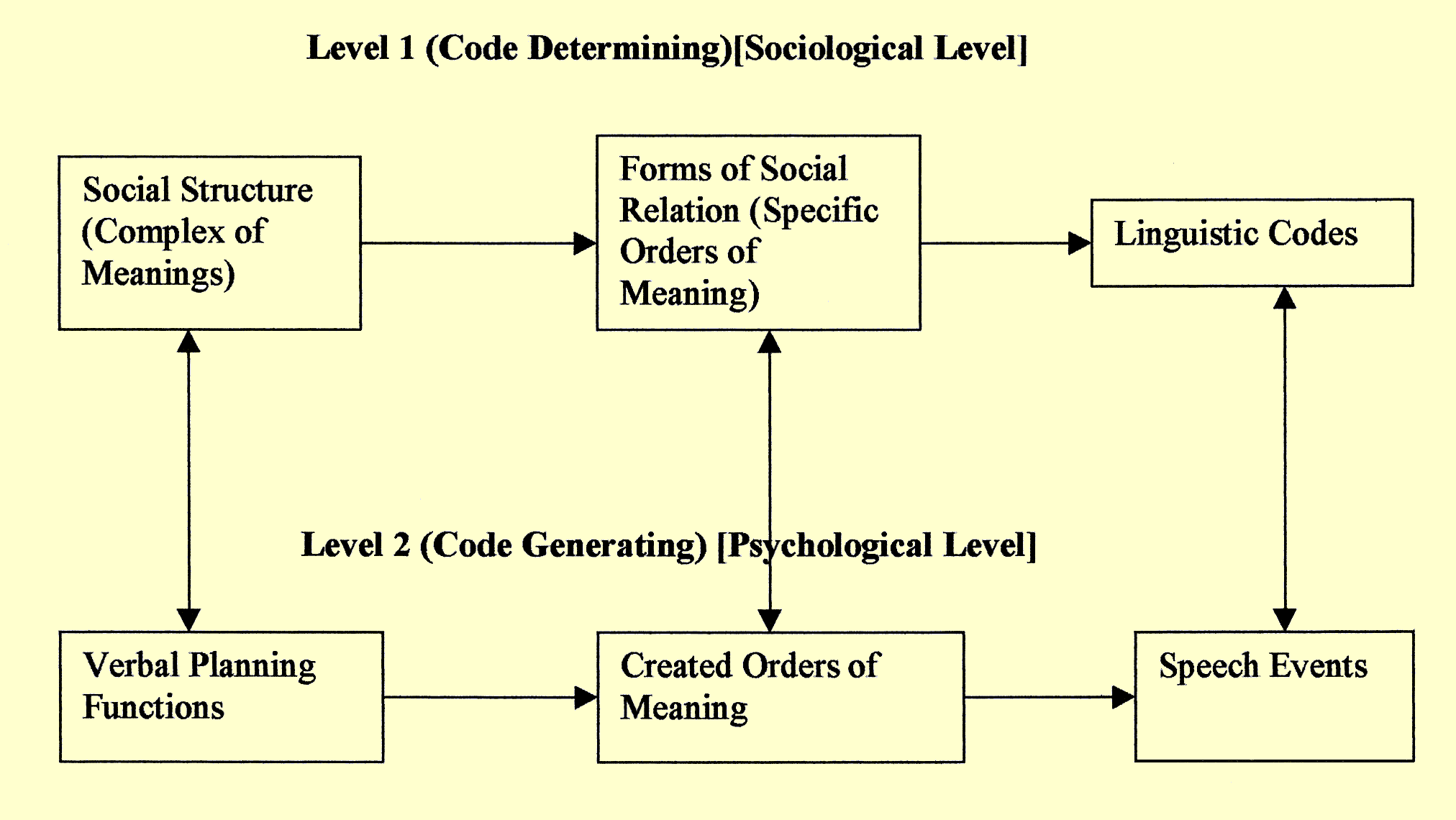Introduction NB This is a very early handout written years ago -- but isn't it still so relevant!!
Bernstein's work seemed to offer the most systematic and rigorous account of deprivation theories, grounded as it was in the systematic study of language (rather than anything vague like 'values', 'attitudes' and so on).
The early work especially seemed to offer a neat chain of argument to connect home background, language and cognition, and educational success. For sociologists, an early interest in this work was that Bernstein saw his work as following Durkheim on social solidarity and its effects on 'collective representations': thus, quite simply, the 'restricted code' grew out of 'mechanical solidarity', while the 'elaborated code' grew from 'organic solidarity'. These types of solidarity were manifested not only in society atlaerge, but in the key socialising agencies -- families and neighbourhoods.
In
less sociological
terms:
(a) Homes and language were connected. Language is a cultural matter, a way of expressing meanings, of coding experiences. If your experience was of a particular type, so your language would code this experience in a recognisable way. How useful it would be if we could show that working-class families offered distinctive kinds of experience, particularly limited kinds, say, (or 'restricted'), and that this was reflected in working-class language. (This is what Bernsteinites like Ford et al.(1971) have tried to show). What if we could show that child-rearing patterns in working class (w.c.) families were inflexible and rigid, that families were authoritarian and dogmatic, offering little chance to experiment or swap roles - the theory should then show that the language of those groups should code this experience and be inflexible, rigid, authoritarian, dogmatic, non-experimental, and context-bound.If we go along with all these assumptions and suggestions, we have a neat 'linguistic deprivation' theory to explain w.c. failure. W.c. language is not up to the tasks required of school language, and this means EITHER (i) w.c. language is deficient, OR (ii) schools are too inflexible for w.c. kids, and fail to adapt to their linguistic competence, OR (iii) people able to use both restricted and elaborated codes are likely to prosper, and that this is the real secret of 'middle-class' success. Which of these alternatives is the one Bernstein really advocates is the subject of debate - he has publicly disowned variant (i) (Bernstein 1971), but the earliest (and most influential?) piece (in Halsey et al (1958)) comes very close indeed to that variant.(b) Language and schools were connected. Language is also a technical device to express not just culture but knowledge, including school knowledge. Let us assume (and we're going to argue this later) that the main function of schools is to express a particular kind of academic knowledge - abstract, literary, capable of expressing complexity, doubt, ambiguity, and based on impersonal, context-free argument. Then school language should also be able to express these qualities - be flexible, rational, abstract, and have an elaborated grammar and syntax to permit elaborated arguments to be coded.
Do we have to go along with all these assumptions, though? What evidence is there for them? The famous early pieces are actually rather weak - Bernstein uses odd samples (public school boys and Post Office Telegraph boys), and the evidence is gathered from laboratory tests not 'natural' language (and laboratory conditions might lead w.c. boys to clam up?). These points are brought out well in Rosen's critique (1972). The famous piece by Labov (Keddie 1973) also shows the importance of context - in the right circumstances, US black kids can produce fluent, expressive language, with elaborate arguments, developed as rationally as anyone else's. (Labov also has objections to the way Bernstein uses a general notion of code to describe actual language variants). Rosen argues the same points could be applied to British w.c. kids.
What of school language? Is it always elaborated, abstract, context-free? Or is it smothered with middle class 'style' - unnecessarily long-winded, full of bluffs and evasion, as context-bound (to the academic game) as any? Some studies of classroom language suggest so (Barnes et al (1976) (and what of some of the language in higher education!) In general, the problem of distinguishing elaborated code from mere over-elaborate style has not been clarified.
Bernstein himself has taken some of these criticisms very seriously, and, for these and other reasons (see Atkinson 1985), has developed his early theories considerably (although the early stuff still appears in B.Ed. essays!). According to Lawton (1968), for example, Bstein. has now:
(a) deconstructed social class per se into a number of different social groups, with different experiences, and different contexts;Lawton's points here can be represented in diagrammatic form (a bit simpler than he does himself) (on p.101) As before, these graphics are not very gripping. You can print out your own version if you wish -- download them here
(b) developed better theories of language and its functions (thanks to Halliday) - the emphasis is now upon language structure, verbal planning, reasoning, fluency (all of them social uses of language, socially variable rather than fixed formal characteristics), rather than grammar, dialect, or content.
Early Model

Second Model download here

Third Model download

These diagrams are difficult to interpret (Lawton's book is necesary for a full understanding), but it is clear that there is no longer an easy connection between social class and "language" (social class can work to produce either forms of social relations or verbal planning functions in Model 3 above), and "language"itself now breaks into linguistic codes and speech events and orders of meaning). Not only that, the levels are now separate and interacting: social structure and verbal planning functions interact in Model 3 (the arrow connecting them is double-headed), and so do codes and speech events (double-headed arrow there too). No doubt, there have been more sophistications and developments since this model too.
In conclusion, it is clear that cultural and linguistic 'deprivation' are not easy concepts. The main author involved offers a much more complex theory of the connection between language, social class, and school achievement than most people think. The simpler versions are riddled with assumptions and value judgements about, or are based on rather weak and dubious evidence on, working class language, culture, and speech. Focussing on the assumptions leads us to the account of w.c. underachievement that came after linguistic deprivation theories. If researchers made lots of asumptions of these kinds, it might be fair to infer that teachers did so too - this leads us into the view that teacher expectations might have a role to play in working class underachievement (precisely what Keddie argues).
Finally, for a brilliant but "difficult" debate about Bernstein, put in terms of an attempt to develop a marxist linguistics, try Pecheux (1982)
References
Atkinson
P
(1985) Language, Structure and Reproduction, London, Methuen.
Barnes
B,
Britton ? and Rosen H et al (1976)
Bernstein
B (1971)"Education cannot compensate for society" in Cosin B et al School
and Society, London, Routledge and Kegan Paul.
Ford J
et
al (1971) in Cosin B et al (eds) ibid
Halsey A
et
al (eds) (1958) Education Economy and Society,
Collier-Macmillan:
London
Keddie N
(ed)
(1973) Tinker,Tailor...
Lawton D
(1968) Social
Class Language and Education, London, Routledge and Kegan Paul
Pecheux
M
(1982) Language Semantics and Ideology, London, Macmillan
Rosen H
(1972) Language
and Class... Bristol, Falling Wall Press